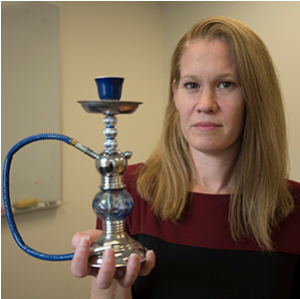By Jim Dryden

Melissa J. Krauss, a research statistician in Washington University’s Department of Psychiatry, holds a hookah pipe. She found that positive mentions about hookah smoking on Twitter may promote the assumption that it is less harmful than smoking cigarettes, when hookah smoking has many of the same harmful toxins as cigarettes.
Positive mentions on Twitter about hookah smoking may promote the assumption that it is less harmful than smoking cigarettes, according to new research at Washington University School of Medicine in St. Louis.
In recent years, hookah smoking has increased in popularity, particularly among young adults. It involves inhaling specially flavored tobacco from a waterpipe. As the tobacco is heated with charcoal, smoke travels through the water and out a hose with a mouthpiece used to inhale the smoke.
According to the Centers for Disease Control and Prevention, hookah smoking has many of the same harmful toxins as cigarettes and carries the same health risks. Yet, the researchers found that most of the 12,000 hookah-related tweets posted per day portray hookah smoking in a positive light.
The findings are available in Preventing Chronic Disease, a CDC journal.
During hookah sessions, people tend to inhale more deeply, explained Melissa J. Krauss, a research statistician in the university’s Department of Psychiatry. “We know it’s harmful, but there is a misconception that because the smoke is going through water, the toxins are filtered out and it’s a cleaner way to smoke. But that is not true. The World Health Organization has reported that one session of smoking hookah can be as bad for you as smoking 100 cigarettes because hookah smokers tend to smoke longer and inhale very deeply.”
The researchers tracked tweets related to hookah smoking for a month in 2014 — more than 358,000 in all. Of those tweets, they analyzed a random sample of 5,000 to see what people were saying. About 87 percent of the sample tweets said positive things about hookah smoking while only 7 percent were negative.
“Nearly 90 percent of these tweets normalized or promoted hookah smoking,” Krauss said. “Those who sent the tweets often said they were smoking hookah or wanting to, or the tweets advertised hookah bars, hookah lounges and hookah products.”
Krauss and her colleagues looked at tweets believed to have the greatest likelihood of being influential — tweets with large numbers of followers and other indicators suggesting they had received significant attention.
She explained that researchers are increasingly turning to social media to study trends in substance use because data is readily available and young people are likely to be engaged. This same group of Washington University researchers previously has analyzed tweets about marijuana and alcohol.
“As with those studies, we found that the vast majority of tweets essentially encouraged substance use,” Krauss said. “As we found with alcohol and marijuana, when people feel compelled to tweet about something, it’s usually because they like it.”
Because Twitter’s influence is new in the realm of public health, it isn’t yet clear how to respond to such messages, Krauss said. In the past, public health officials have mounted successful campaigns to inform people about dangers associated with cigarette smoking and to urge them to quit.
“Public health experts need to learn how to create an influential presence on social media and find the best strategies to spread their messages,” she said. “But we aren’t there yet.”
Funding for this research comes from the National Institute on Drug Abuse of the National Institutes of Health (NIH), grant numbers R01 DA039455, R01 DA032843, K02 DA021237 and R01 DA031288.
Krauss MJ, Sowles SJ, Moreno M, Zewdie K, Grucza RA, Bierut LJ, Cavazos-Rehg PA. Hookah-related Twitter chatter: a content analysis. Preventing Chronic Disease, vol. 12 (150140), published online July 30, 2015. http://dx.doi.org/10.5888/pcd12.150140.

